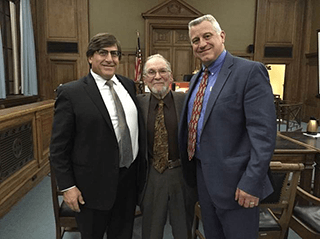Representing People, Not Just Handling Cases: Why I Get to Know My Clients
Representing People, Not Just Handling Cases: Why I Get to Know My Clients
In To Kill a Mockingbird, Atticus Finch tells Scout: “You never really understand a person until you consider things from their point of view… until you climb inside it and walk around in it.”
I think about those words when I take on a new client. Understanding the person, not just their case, is an absolutely essential part of providing effective representation and is the foundation of a strong and productive attorney-client relationship.
Accidents and Injuries Don’t Happen in a Vacuum
So much of what I do as a lawyer involves gathering facts and information: statements of witnesses, medical records, expert testimony, relevant case law that supports my client’s case. But the facts that form the basis of a claim or lawsuit don’t exist in a vacuum.
How fast the other driver was going doesn’t tell me anything about how an accident has effected someone’s life, their family, their day to day struggles with the injuries left in the accident’s wake. How a doctor breached the standard of care and committed a medical error that resulted in the unnecessary and sudden death of a loved one does not tell me, and won’t tell a jury, about the gaping hole that is left in a family’s life; about how the loss impacts a child without a father, a husband without a wife, a mother without a son or daughter.
Understanding a Changed Life
But that is why my clients are here. Not to talk about their case or the accident; but to find answers and seek help dealing with the upheaval in their lives. In order to fully understand that upheaval, and what is needed to bring some semblance of peace and hope to a difficult situation, I need to spend time getting to know my clients.
I will often meet with clients at their home or place of work, not only because it may be more convenient for them, but also because it gives me a greater sense of who they are, how they live, what struggles they may have to deal with. Perhaps an injury has made it difficult for a client to walk; if I see that they need to walk up stairs to get to their front door or to their bedroom, that gives me a better sense of just one aspect of the challenges they face many times a day.
A Story to Tell
Taking the time to get to know my clients also affords me the opportunity to learn their story. Effective trial advocacy is all about telling a story in a powerful and meaningful way. Doing so requires more than just conveying dates and diagnoses, it requires sharing the things that makes each one of us unique so a jury can get an appreciation that the decision they have been charged to make is not just about a set of circumstances but about their fellow human beings. And in the end, that is what my job is really about: helping my fellow human beings.
Nugent & Bryant: Your Connecticut Personal Injury Law Firm
At Nugent & Bryant, we have worked hard to build a reputation as one of Connecticut’s premier law firms advocating for accident victims’ rights. We are an exceptional law firm that has been achieving results for our clients over 30 years. If you have suffered a personal injury or catastrophic injury, or are dealing with the aftermath of the wrongful death of a loved one, call us today at (203) 795-1111 for a free consultation.
This article has been prepared by Nugent & Bryant for informational purposes only and does not, and is not intended to, constitute legal advice. The information is not provided in the course of an attorney-client relationship and is not intended to substitute for legal advice from an attorney licensed in your jurisdiction.
Tell Us About Your Case
Contact Us
We will get back to you as soon as possible.
Please try again later.
Nugent Lawyers © 2009 - 2024. All Rights Reserved - Disclaimer


